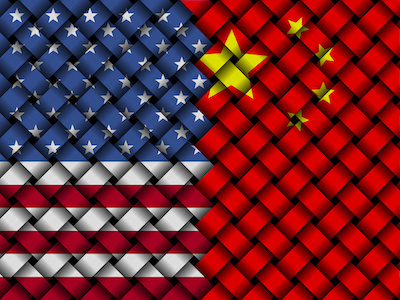
On agriculture, China reiterated a promise that it has broken in the past to let in more beef. Previously, we, as reciprocity, had been withholding publication of a permissive rule on Chinese poultry, but we have now relented. Advantage China.
This is from Larry Summers, “Trump’s ‘China Deal’ is only a good deal for China,” May 24.
HT2 Mark Thoma.
In estimating “advantage,” what factor is Larry missing? U.S. consumers who like poultry. There are a lot of us. When you see someone forgetting even to point out that our consumers gain when foreign producers send us cheaper products, what prominent U.S. politician does that sound like? That’s right: Trump. Thus the titled of this post: Larry Summers, in his rhetoric, is starting to imitate Donald Trump.
Back in May 2000, I wrote an article in Fortune titled “What Clinton and Gore Don’t Say.” In it, I pointed out that U.S. trade negotiators rarely point out the benefits to consumers from free trade. I ended by writing:
In the negotiation process, the U.S. treats cuts in its trade restrictions as concessions rather than as the benefits they are. That’s why the consumers’ gains get lost in the shuffle. Economists like U.S. Treasury Secretary Lawrence Summers understand that. But U.S. Trade Negotiator Charlene Barshefsky and Vice President Gore? I’m not so sure.
Now, I’m no longer sure about Larry.
And, in a way, he’s even worse than Trump. He writes:
In addition to the leverage we sacrificed by committing to issue the poultry rule, we made other meaningful concessions. First, we agreed to allow exports of liquefied natural gas from the US to China. To at least a small extent that would mean higher heating costs for U.S. consumers and higher energy costs for U.S. producers.
Get it? Normally, even the Trumps and Summers of the world will at least regard as a gain an increase in U.S. exports due to declines in trade barriers. But because this particular gain in U.S. exports is due to a decline in a U.S. trade barrier, Larry counts it as a loss. It is a loss for U.S. consumers, but it’s not hard to show that it’s a net gain to the United States when we include the gains to LNG producers.

READER COMMENTS
zeke5123
May 24 2017 at 4:59pm
Prof. Henderson,
It seems that if you believe trade is ex ante good, then it naturally follows that reducing barriers (either on the export or import side) is good. It seems strange, then, if you believe that trade can have net negatives because of the impact of imports on the domestic market that you also believe that exporting also is a net negative for the domestic market. That seems…incompatible. I think Summers was writing a piece to hit Trump and so utilized whatever logic is possible to try to score a hit.
With that said, a charitable way to view trade negotiations is that most government officials are mercantilists. Thus, even if you would unilaterally lower trade barriers, it would be more beneficial to bilaterally lower trade barriers. Therefore, talking about concessions may be a tactical way to get more towards the bilateral disarmament.
David R. Henderson
May 24 2017 at 5:24pm
@zeke5123,
It seems strange, then, if you believe that trade can have net negatives because of the impact of imports on the domestic market that you also believe that exporting also is a net negative for the domestic market.
I’m not sure to whom you’re attributing these ideas.
Thus, even if you would unilaterally lower trade barriers, it would be more beneficial to bilaterally lower trade barriers. Therefore, talking about concessions may be a tactical way to get more towards the bilateral disarmament.
Absolutely. That’s what I said in the Fortune piece I linked to.
Thaomas
May 25 2017 at 8:55am
Summers’s poultry for beef point is that we did not insist on the benefits for our beef exporters in exchange for allowing China to continue screwing its poultry consumers. And the larger point is that (good for him) President Trump has reneged on starting the trade war with China that his supporter seem to want.
LK Beland
May 25 2017 at 9:28am
Larry Summers is probably thinking of trade not only in a Ricardo type of way, but also embedding it in his secular stagnation view.
In a secular stagnating world, a trade deal can lead to one country exporting its unemployment to another (it all depends on your model, of course).
TMC
May 25 2017 at 10:21am
Thaomas, if you click through you’ll find “Under the agreement China will allow imports of US beef, while the US will allow the import of cooked poultry from China”
So the agreement does include us selling beef to China. Never take a Trump complainer at his word as you’ll be 90% wrong.
David, with Trump, always judge his actions. His rhetoric is always a set up to the negotiation that’s about to take place, not what he intends the end to be.
Zeke5123
May 25 2017 at 3:28pm
Prof. Henderson,
I was suggesting that Larry Summers was the one seemingly suggesting that both imports and exports are bad, which seems impossible.
BC
May 27 2017 at 1:15am
On the plus side, free traders now have ready-made “nationalist” arguments in favor of trade, if we are so inclined to use them: we should “retaliate” against other nations’ trade barriers by lowering our own tariffs, thus depriving those other nations’ citizens some of their own production, which will, a la Summers, raise the prices those citizens face. We can also retaliate or “win” at trade by lowering our export barriers so that our exports will compete against other nations’ domestic industries.
Of course, I jest (sort of). In the long term, it is better to help everyone understand that trade is beneficial to all countries.
Comments are closed.